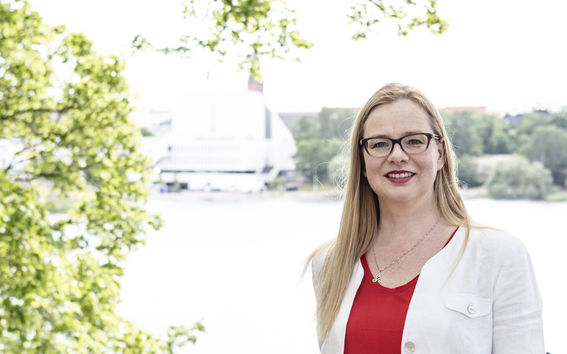‘A deeper understanding of landscape can be the key to designing better cities’

What is your research about?
‘In my doctoral dissertation, I explore the intersections of phenomenological philosophy and landscape architecture—that is, what an approach that emphasizes human perceptions and experiences has to offer for analyzing and understanding landscapes. My research focuses on landscape as a multidimensional phenomenon, making use of multidisciplinary and experiential methods.
I am particularly interested in green urban landscape, and as case examples I use the green sequences in the cities of Boston and Helsinki, which have some features in common. Emerald Necklace is Boston’s historic series of parks, and Central Park is the oldest of Helsinki’s green fingers.
With the help of narratives describing these landscapes, we can view them from different perspectives and thus bring out both visible and invisible elements allowing us to understand the landscapes more profoundly. The materials I have used range from a site-specific performance and moviemaking manifesting my own experience, to a map-based public survey providing the perspective of others on the experience of green areas.’
What is important in it?
‘In my research, I present a landscape analysis framework to complement our ways of understanding landscapes. It is important to understand, in particular, the dynamic and multi-layered nature of green urban landscape, and how the invisible—memories, preferences, background information and value discourse—can be made visible in the design processes. It is also important to consider both the landscape and the social context. Cultural and nature-driven processes shape the landscape and making them visible deepens our understanding of the world.
Our personal experiences determine our values and values determine our decisions. Therefore, taking into account and understanding experience is important in landscape analysis and urban planning. We should aim at building bridges between different fields and methods, as well as between the systemic thinking of the planner and how the landscape is experienced.’
Maria JaakkolaWe should build bridges between different fields and methods, as well as the systemic thinking of the planner and the landscape experience."
What can it lead to?
‘A phenomenological perspective emphasizing multi-sensory experience, comprehensiveness, empathetic understanding and cohesion between human and nature can be the key to a new kind of relationship with nature. An approach where nature is perhaps considered a separate ecosystem controllable by humans, could be replaced by responsible involvement. Our actions would be guided by an understanding of, and an interest in, the processes of nature and culture.
The analysis framework presented in my study will hopefully spark a debate about what is essential in design practices, what one should consider when planning and designing urban landscape, and, most importantly, what are the values that guide the ways the future of our cities is shaped. If all planning was required a holistic understanding of landscape and its values, we would perhaps design better cities.
I’m also hoping that, the perspectives I have presented would inspire to develop better tools for understanding urban landscape as experienced with all the senses, and for exploring and measuring that experience, or even for reconciling different perspectives. I would also like to see more innovative ways to make the invisible visible through art and design. At its best, this can be followed by design that is more responsive to human needs, more understanding of human's role as part of nature and more sensitive to the interaction between them.’
Maria Jaakkola defended her doctoral dissertation Understanding Green Urban Landscape - A Phenomenological Approach at Aalto University 15 October, 2021.
Contact information:
Landscape architect Maria Jaakkola, maria.jaakkola@hel.fi, 0403342 205
Read more news

The proxy server for remote access to e-resources is changing
If you have problems using e-resources, try accessing the e-resource using VPN connection.
A sustainable city is also age-friendly
Cities must involve older adults more strongly in the planning of the urban environment.
Renate Zhang’s journey in optimising the cost of creation
During the research program at Aalto University, Renate Zhang developed a cost-saving method that inspired her to pursue a doctoral degree.






